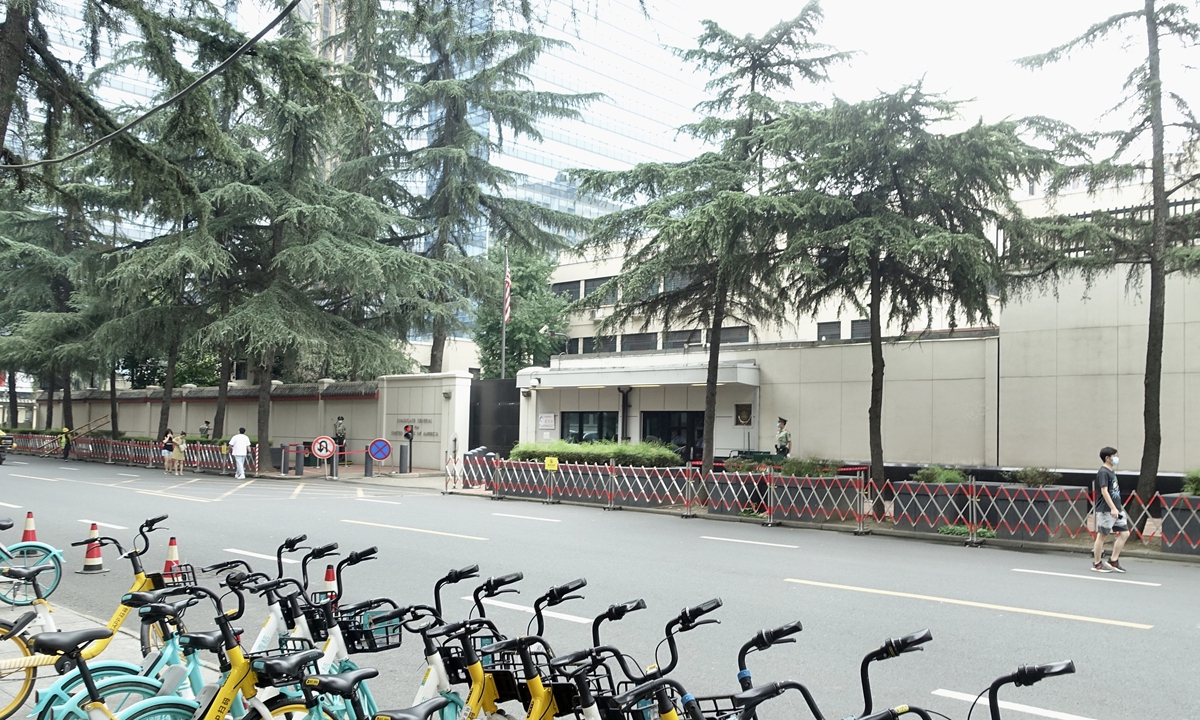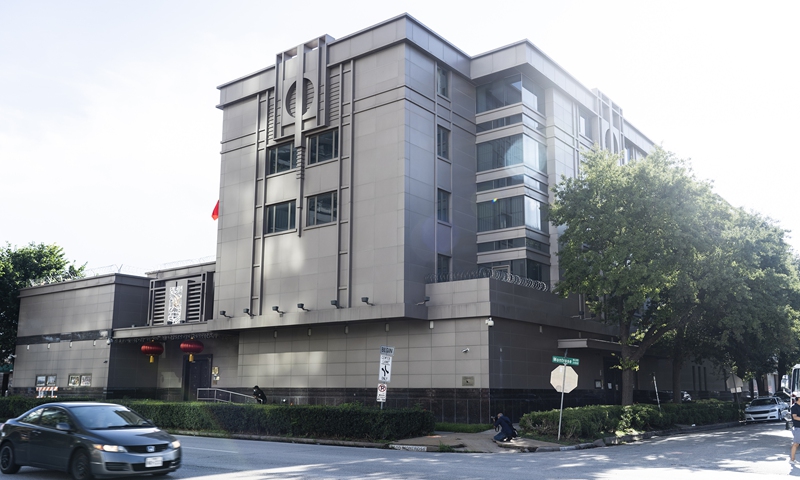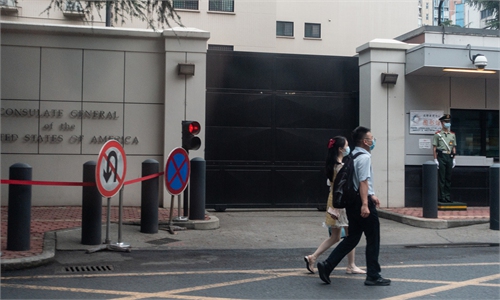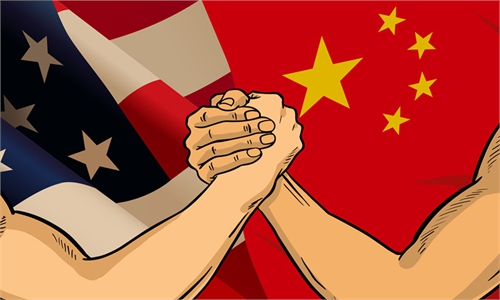China observes diplomatic dignity to close US Chengdu consulate, may downsize HK-based US personnel: experts

A photo of the US consulate in Chengdu taken on Friday. China on Friday ordered the US to close its consulate in Chengdu, Southwest China's Sichuan Province, in retaliation for the US asking China to close its consulate in Houston.
China has ordered the US to close its consulate in Chengdu, Southwest China's Sichuan Province, in retaliation for the US asking China to close its consulate in Houston, the Chinese Foreign Ministry said on Friday, which analysts have called "an equivalent and reciprocal countermeasure," reflecting the core principle of diplomatic dignity as well as China's efforts to bring the conflict with the US under control.The order came after the US abruptly asked China on Tuesday to close its consulate in Houston within 72 hours, which is a unilateral political provocation by the US against China, and a grave violation of international law and the basic norms governing international relations.
Closing the US Chengdu consulate is a legitimate and necessary response. China's move conforms with international law and the basic norms of international relations, as well as diplomatic practices, the Chinese Foreign Ministry said on Friday.
The current situation is not what China wants to see, and the responsibility rests entirely with the US, the ministry said, noting that China once again urges the US to revoke its decision and create necessary conditions for the return of bilateral relations.
China also gave the US consulate in Chengdu 72 hours to close, as it informed the US on Friday morning. The US consulate in Chengdu will be closed on Monday morning, a source close to the matter told the Global Times.

China's Consulate General in Houston. Photo: VCG
Equivalent and reciprocalCompared to the US consulates in East China's Shanghai and South China's Guangdong Province, the consulate in Chengdu has a relatively smaller business volume, which shows that China is taking a restrained approach, Li Haidong, a professor at the Institute of International Relations of China Foreign Affairs University, told the Global Times on Friday.
The diplomatic spat has quickly escalated, as some reports hint the US may close more Chinese consulates. "Unlike Washington that uses tactics to further inflame tensions, Beijing has been trying to remain restrained," Li said.
Some speculation had earlier emerged that China might close down the US consulate in Wuhan, Central China's Hubei Province. However, that would be an underestimation of China's will in taking "equivalent and reciprocal countermeasures," observers said.
Since some of the US staff have not returned to the Wuhan consulate, its closure would not be equivalent to US bullying and extreme pressure tactics, and would be seen as weakness by the US.
Lü Xiang, a research fellow at the Chinese Academy of Social Sciences in Beijing, told the Global Times that choosing the US consulate in Chengdu is an equivalent and reciprocal countermeasure, as the number of consulate employees is almost equal to that of China's consulate in Houston.
The US consulate in Chengdu covers consular affairs in several southwestern provinces and regions, including the Tibet Autonomous Region, had attracted public attention for several reasons. It was opened in October 1985 by former US President George Bush, and had been besieged by crowds to protest the US bombing of the Chinese Embassy in Belgrade in 1999.
It also became the scene in 2012 of an incident involving Wang Lijun, a former vice mayor and police chief of Southwest China's Chongqing, who defected and entered the consulate, but later left on his own volition.
The Chengdu consulate is relevant to strategic security affairs, Li noted.
Documents and information relevant to Tibet and ethnic groups living in the area have been collected through the consulate, and an observer on China-US relations who preferred not to be named told the Global Times on Friday that the Chengdu consulate has become a major channel for the US to interfere in Tibet affairs and conduct "penetration work," which has a negative impact on the stability of the region.
Some personnel from that consulate have engaged in activities inconsistent with their identities, Wang Wenbin, a spokesperson for the Chinese Foreign Ministry, told a routine press conference on Friday. "China had made representations and the US is fully aware," he said.
"Closing the US consulate in Chengdu sent out a clear message: China won't take the first move to sabotage China-US relations, but will definitely fight back against US moves that are 'out of line,'" Shen Yi, a professor at the School of International Relations and Public Affairs of Fudan University, told the Global Times on Friday.
Closing consulates and expelling diplomats is a conventional way to go about the strategic games played between major powers, and there have been many previous examples in history, according to Chinese observers. "There had also been more serious incidents in the diplomatic field before between China and the US; that is, the direct downgrade of diplomatic relations, which is more serious than expelling diplomats," Shen said, noting that China has the wisdom and will to fight this game in accordance with its playbook.
"However, shutting down each other's consulates and expelling diplomats will result in unnecessary costs between the diplomatic relations of the two countries, and will lead to uncertainties, but may also end up only at the level of 'spitting,'" he said.
'Worst three months'
Other Chinese consulates in the US are located in cities like New York and San Francisco, which are in "blue states" that the Republican party can't expect to win. It would be meaningless for Trump to close more consulates as it would not help him win the election, Lü said.
"The US is unlikely to close more Chinese diplomatic missions. Choosing the consulate in Houston might help the Trump administration distract the public's attention of the worsening epidemic situation in Texas, a traditional 'red state,' which the Republican party can't afford to lose," he said.
If the US continues its crazy moves, China can play another card to retaliate; that is, expel so-called "diplomats" from the US who are actually CIA agents in China, especially those in the Hong Kong region, Lü noted, adding that this could make the US really feel the pain as its intelligence networks in China, which it has spent decades to build, will be closed down. It would be unwise for the US to continue the fight, as it will lose more than China.
Given the current escalation, Chinese observers believe that the next three months before the US presidential election will be a highly dangerous period for the two countries, and even a military conflict can't be ruled out.
"The Trump administration is now taking an 'adventurist' strategy in its China policy, with more uncertainties, as it tries to shift the blame to China for its failed COVID-19 response," Li said, noting that it's also highly dangerous that the country's fate has been kidnapped by the election roadmap of certain politicians.
"After the election is over, there will be an adjustment period for the US government to reconsider its China policies. However, long-term confrontation won't change," Li added.
Ezra Vogel, Professor Emeritus at Harvard University and a leading American scholar on East Asian affairs, told the Global Times in a previous interview that, unfortunately, there is a possibility of an armed confrontation between the two countries. "If there is a little scuffle in the South China Sea, it could soon escalate. And if the countries fail to control it, it could be devastating, and everybody would lose," he said.
Some Chinese netizens said they feel "very sad" for the American people who won't have access to delicious cuisine like hotpot or giant pandas in Sichuan, as they would feel the consequences of their reckless politicians who decide to endlessly challenge the bottom line of the Chinese government.
Chengdu has become a compelling destination for foreign travelers, particularly as a heaven for food lovers.
Areas covered by the Chinese consulate in Houston and areas covered by the US consulate in Chengdu share some similarities. For example, those areas are home to high-tech industries, aerospace and pharmaceutical firms. While the NASA Johnson Space Center is located in Houston, Sichuan is also the home to the Xichang Satellite Launch Center.

Photo: GT




